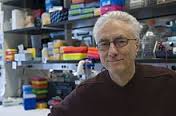Prader-Willi syndrome (PWS) is caused by a loss of genes normally expressed only from the paternal chromosome 15. About 70% of PWS cases arise from Type 1 and Type 2 deletions, which are about 5 million DNA base pairs in size. Genetic mapping data from unique patients harboring smaller deletions, “microdeletions”, in the PWS region implicate the gene SNORD116@ as a candidate gene, whose absence is sufficient to cause the most salient features of PWS, including feeding difficulties in infancy, rapid weight gain after about two years of age, extreme hunger, obesity, and developmental delay. PWS affects specific brain regions at the cellular level, making stem cell technology a particularly effective method for the study of this disease. Stem cell technologies enable researchers to generate and study the cell types affected by human diseases, creating a model of the ‘disease in a dish’. In order to better understand how Prader-Willi syndrome affects brain cells, we will transform skin cells from PWS patients into pluripotent stem cells (iPSC). To specifically understand the effects of loss of SNORD116@ we will use genetic engineering to delete the SNORD116@ gene in an iPSC line from an unaffected individual. This approach allows us to study the effects of the loss of SNORD116@ without confounds of naturally occurring variations in human genetics. The neurons generated from PWS patients will allow us to characterize the molecular and cellular defects that are caused by this genetic syndrome. Understanding how PWS affects the brain at the cellular and molecular level can inform novel therapeutic targets for PWS patients. We will also study the connection between the loss of SNORD116@ and increased levels of ghrelin, the ‘hunger hormone’. A special aspect of this proposal is the inclusion of young investigators who could become the next generation of PWS scientists.
Research Outcomes:
Loss of the imprinted, non-coding Snord116 gene cluster in the interval deleted in the Prader Willi syndrome results in murine neuronal and endocrine pancreatic developmental phenotypes. Burnett LC, Hubner G, LeDuc C, Morabito MV, Carli JFM, Leibel RL. Human Molecular Genetics. 2017 Sep 6.
Induced pluripotent stem cells (iPSC) created from skin fibroblasts of patients with Prader-Willi syndrome (PWS) retain the molecular signature of PWS. Burnett LC, LeDuc CA, Sulsona CR, Paull D, Eddiry S, Levy B, Salles JP, Tauber M, Driscoll DJ, Egli D, Leibel RL. Stem Cell Research. 2016 Nov; 17(3):526-530.
Determination of the half-life of circulating leptin in the mouse. Burnett LC, Skowronski AA, Rausch R, LeDuc CA, Leibel RL. International Journey of Obesity (London). 2017 Mar;41(3):355-359.
Differentiation of hypothalamic-like neurons from human pluripotent stem cells. Wang L, Meece K, Williams DJ, Lo KA, Zimmer M, Heinrich G, Martin Carli J, Leduc CA, Sun L, Zeltser LM, Freeby M, Goland R, Tsang SH, Wardlaw SL, Egli D, Leibel RL. Journal of Clinical Investigation. 2015 Feb 2;125(2):796-808.
Funded Year:
2013
Awarded to:
Rudolph Leibel, MD
Amount:
$108,000 (OSS Funds, with PWSA)
Institution:
Columbia University
Researcher:





